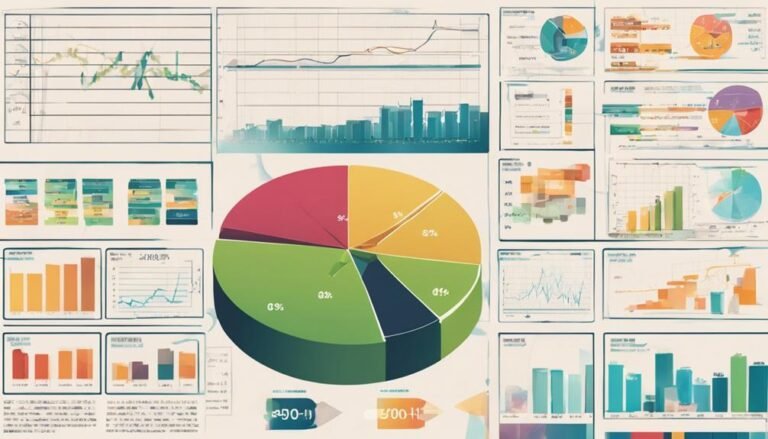Quant Career Development: Pathways & Growth
Quantitative analysts, often referred to as “quants,” play a crucial role in the financial industry by using mathematical and statistical techniques to analyze and evaluate financial instruments, markets, and participants’ behavior. They work in various firms, including commercial banks, investment banks, wealth management firms, hedge funds, insurance companies, management consulting firms, accountancy firms, and financial software companies.
Key Takeaways:
- Quantitative analysts use mathematical and statistical techniques to analyze financial instruments and markets.
- Quants work in various firms, including banks, hedge funds, and consulting firms.
- Career development in quantitative analysis requires specialized skills and advanced education.
- Networking is crucial for advancing in quantitative finance careers.
- Industry trends in quant careers include rapid computerization and the increasing demand for data analysis and machine learning.
What Does a Quantitative Analyst Do?
A quantitative analyst plays a critical role in the financial industry by utilizing mathematical and statistical techniques to analyze and evaluate various aspects of financial systems. They construct and develop mathematical models to gain insights into complex financial systems, ultimately assisting in decision-making support, financial risk assessment, and investment strategies.
Financial Analysis: Quantitative analysts perform extensive financial analysis using mathematical models to understand and interpret market trends, pricing securities, and derivative instruments. By conducting rigorous analysis and examining historical data, they provide valuable insights into potential risks and returns. This enables stakeholders to make informed decisions about investments and identify opportunities for growth.
Pricing Securities and Derivative Instruments: Quantitative analysts use their mathematical models to accurately price securities and derivative instruments. By evaluating various factors such as market conditions, volatility, and interest rates, they determine fair values and assist in trading decisions.
Financial Risk Assessment: Quantitative analysts assess and manage financial risk by modeling and simulating different scenarios. They identify potential risks associated with investments and develop strategies to mitigate them. This helps organizations minimize exposure to financial risks and make sound risk management decisions.
Investment Strategies: Quantitative analysts play a crucial role in developing and implementing investment strategies. They analyze market data, historical patterns, and mathematical models to identify profitable opportunities and formulate effective investment strategies. By leveraging their quantitative expertise, they help optimize portfolio performance and maximize returns.
Quantitative analysts provide decision-making support by combining their mathematical expertise with market analysis to deliver valuable insights to financial institutions and investment firms. Through their comprehensive analysis, they contribute to the development of investment strategies and risk management practices.
Overall, the work of a quantitative analyst is vital for organizations operating in the financial industry. Their mathematical and analytical skills, combined with their deep understanding of financial instruments and markets, make them invaluable for decision-making and strategy implementation.
Image:
Note: The image above visually represents the role of a quantitative analyst in financial analysis and decision-making support.
Career Path for Quants
Many quantitative financial analysts start their careers in entry-level positions as research analysts after completing a bachelor’s degree in a field that provides practical quantitative skills, such as statistics, finance, or economics. These positions serve as a stepping stone for aspiring quants, allowing them to gain valuable experience in data analysis, financial modeling, and research methodologies.
As research analysts, individuals collaborate with senior analysts and assist in conducting market research, collecting data, and performing quantitative analysis. They develop a solid foundation in statistical techniques, programming languages, and financial modeling, which are essential skills for a successful career in quantitative analysis.
“Starting as a research analyst was a great opportunity for me to apply my quantitative skills in a practical setting. I learned how to collect and analyze data, create mathematical models, and identify patterns in financial markets. It laid the foundation for my further career growth as a quant.” – John Smith, Quantitative Analyst
However, long-term careers in quantitative analysis usually require advanced degrees such as a master’s or a doctorate. These advanced degrees provide individuals with a deep understanding of complex mathematical concepts, research methodologies, and advanced statistical techniques.
Top candidates for analyst positions often hold doctorates and have experience in independent research and designing mathematical models. They have the expertise to develop sophisticated quantitative models, analyze complex financial data, and provide valuable insights to support investment and risk management strategies.
Below is a table highlighting the typical educational qualifications and career progression in the field of quantitative analysis:
| Education | Career Stage |
|---|---|
| Bachelor’s degree in statistics, finance, or economics | Entry-level positions (Research Analyst, Data Analyst) |
| Master’s degree in quantitative finance, financial engineering, or a related field | Specialized roles (Quantitative Analyst, Risk Analyst, Portfolio Manager) |
| Doctorate in a quantitative field | Advanced roles (Lead Quantitative Analyst, Quantitative Strategist, Quantitative Researcher) |
Note: The table above provides a general overview and may vary depending on the specific industry and company.
Regardless of the educational path, continuous learning and staying updated with the latest industry trends and advancements in quantitative analysis are crucial for career growth in this field.
Educational Qualifications for Quants
To pursue a successful long-term career as a quantitative analyst, it is highly beneficial to hold a graduate degree in a quantitative field. While a bachelor’s degree may be sufficient for some entry-level positions, advanced roles in the field usually require additional education.
Graduate degrees in finance, economics, mathematics, or statistics provide a solid foundation for quantitative analysis. These programs equip individuals with the necessary theoretical knowledge and quantitative skills to excel in the field.
In addition to traditional quantitative fields, degrees in theoretical physics, engineering, computer science, and related disciplines can also be acceptable for aspiring quants. These fields often provide intensive training in mathematical modeling and quantitative techniques, which are highly valuable in quantitative analysis.
For professionals with doctorate-level qualifications in non-finance fields, pursuing a master’s degree in financial engineering or mathematical finance can be a strategic move to transition into the financial industry. These specialized programs offer a focused curriculum that combines financial concepts with quantitative methods.
It’s worth noting that the specific educational requirements may vary depending on the employer and the nature of the role. Some positions may prioritize a strong academic background, while others may place more emphasis on practical experience or certifications. Therefore, individuals should carefully research the requirements of their target roles and tailor their educational pursuits accordingly.
Benefits of a Graduate Degree in a Quantitative Field
“A graduate degree in a quantitative field provides individuals with in-depth knowledge and specialized skills, setting them apart in the competitive landscape of quantitative analysis.”
A graduate degree offers several advantages for aspiring quants:
- Advanced knowledge: Graduate programs delve deeper into quantitative methods, financial theories, and advanced statistical techniques, equipping individuals with a comprehensive understanding of the subject matter.
- Specialized skills: These programs focus on developing quantitative skills and analytical abilities, enabling individuals to effectively apply mathematical models and statistical tools in real-world financial scenarios.
- Networking opportunities: Graduate programs often provide networking opportunities with industry professionals, allowing students to build connections and gain insights into the latest trends and job opportunities in the field.
- Employment prospects: Holding a graduate degree in a quantitative field enhances the credibility of job applicants and increases their chances of securing desirable positions with competitive compensation.
Overall, a graduate degree in a quantitative field lays a strong foundation for a successful career as a quantitative analyst. With the right educational qualifications, individuals can embark on a path of continuous learning and professional growth within the field of quantitative finance.
Common Graduate Degrees for Quants
| Graduate Degree | Description |
|---|---|
| Master’s in Finance | Aims to provide comprehensive knowledge of financial markets, financial management, and quantitative techniques for financial analysis. |
| Master’s in Economics | Focuses on advanced economic theories, econometrics, and empirical analysis to understand and interpret economic data. |
| Master’s in Mathematics | Emphasizes advanced mathematical concepts, including calculus, algebra, probability theory, and mathematical modeling. |
| Master’s in Statistics | Covers advanced statistical methods, data analysis techniques, and statistical software for quantitative research and analysis. |
| Master’s in Financial Engineering | Combines finance, mathematics, and computer science to develop quantitative models and risk management strategies in financial markets. |
Skills Required for a Successful Quant Career
Quantitative analysts play a vital role in the financial industry, utilizing their expertise in data analysis and mathematical modeling to provide valuable insights. To succeed in this field, quants need to possess a diverse set of skills that enable them to excel in their roles. Here are key skills required for a successful quant career:
Programming Skills
Proficiency in programming languages is essential for quantitative analysts. They need to be well-versed in languages such as C++, Python, SQL, Java, and VBA. These programming skills allow quants to develop and implement complex algorithms, build quantitative models, and analyze large datasets efficiently.
Database Management
As quants work with vast amounts of financial and market data, they must have strong database management skills. This includes the ability to organize and structure data effectively, ensure data integrity and security, and retrieve information efficiently when needed.
Computer Programming Languages
Quantitative analysts must be proficient in working with computer programming languages to perform data analysis and model development. Knowledge of languages like Python, used extensively for data analysis and scientific computing, is highly valuable in this field. Alongside Python, quants may also utilize languages such as R, MATLAB, and SAS for statistical analysis and modeling.
Statistical Analysis Software
Proficiency in statistical analysis software is a crucial skill for quants. Software tools like MATLAB, R, and SAS are widely used for statistical modeling, data visualization, and hypothesis testing. Mastery of these tools allows quants to derive meaningful insights and make informed decisions based on statistical analysis.
Written and Verbal Communication
Effective communication skills are essential for quants as they often need to document and present their work to stakeholders. Clear and concise written communication ensures that the insights and findings from quantitative analysis are effectively communicated. Additionally, strong verbal communication skills facilitate collaboration with technical staff, business units, and clients, allowing quants to effectively convey complex concepts and recommendations.
Technical Collaboration
Quantitative analysts frequently work in teams, collaborating with other analysts and professionals across different disciplines. The ability to work well in a team, actively participate in discussions, and contribute to technical collaborations is crucial. It allows quants to leverage the diverse expertise of the team, leading to more accurate and comprehensive analysis.
In conclusion, a successful quant career requires mastery of programming languages, database management, statistical analysis software, and effective written and verbal communication. Additionally, the ability to collaborate technically with a team enhances the overall performance of quantitative analysts in the dynamic financial industry.
Skills and Qualifications for Quantitative Traders
Quantitative traders play a critical role in the financial industry, using mathematical and statistical models to analyze market data and make informed trading decisions. To excel in this competitive environment, quantitative traders require a specific set of skills and qualifications. Let’s explore the key skills and expertise necessary for success in this field.
Market Data Analysis
Quantitative traders must possess a deep understanding of market data analysis. They leverage mathematical and statistical models to interpret market trends, identify patterns, and uncover valuable insights. Proficiency in analyzing market data is crucial for making accurate trading decisions.
Mathematical and Statistical Models
Proficiency in mathematical and statistical models is essential for quantitative traders. They employ these models to forecast market movements, evaluate investment opportunities, and assess the potential risks associated with different trading strategies. Knowledge of mathematical and statistical concepts forms the foundation of their decision-making process.
Programming Skills
Quantitative traders need strong programming skills to implement their trading strategies effectively. Proficiency in programming languages such as Python, C++, SQL, R, and Java enables them to develop complex algorithms, perform data analysis, and optimize their trading systems. Programming skills are invaluable for automating trading processes and leveraging quantitative techniques.
Price Indexes and Statistical Analysis
Quantitative traders should possess a thorough understanding of price indexes and statistical analysis techniques. Familiarity with price indexes helps them track and compare market performance accurately. Statistical analysis enables them to assess the statistical significance of trading signals, evaluate potential risks, and analyze the performance of their trading strategies.
Numerical Linear Algebra
Numerical linear algebra is another essential skill for quantitative traders. It involves solving complex mathematical problems related to matrices and vectors. Proficiency in numerical linear algebra allows traders to manipulate and analyze large sets of financial data efficiently, resulting in better decision-making.
Machine Learning
Machine learning is a rapidly growing field that has gained significant importance in quantitative trading. Traders who have expertise in machine learning techniques can leverage these algorithms to analyze large volumes of data and identify hidden patterns or signals that may lead to profitable trading opportunities.
Ability to Handle Pressure
Trading in the financial markets involves high-pressure situations and fast-paced decision-making. Quantitative traders must thrive under pressure and remain calm in intense trading environments. The ability to handle stress and make rational decisions in time-sensitive situations is crucial for success in this field.
Competitive Environment
Quantitative trading operates in a highly competitive environment. Traders must have a competitive mindset, continuously adapting and refining their strategies to stay ahead of the curve. They should possess a strong work ethic, a hunger for knowledge, and a constant drive to improve their skills.
To summarize, quantitative traders require a unique skill set to thrive in the financial industry. Market data analysis, mathematical and statistical modeling, programming skills, and knowledge of price indexes are crucial to making informed trading decisions. Additionally, proficiency in numerical linear algebra, machine learning, the ability to handle pressure, and thriving in a competitive environment are necessary for success in this dynamic field.
Essential Skills for Quants
Being a quant requires a strong foundation in quantitative skills across multiple fields. These skills encompass a deep understanding of concepts such as multivariate calculus, differential equations, linear algebra, statistical inference, and probability theory.
Additionally, proficiency in programming languages is crucial for quants. One programming language that is widely used in the field is Python. Its versatility and extensive libraries make it a popular choice among quantitative analysts.
Furthermore, knowledge of econometrics is essential for quants. Econometrics is the application of statistical methods to economic data, enabling quants to analyze and interpret financial information accurately.
Quants employ their quantitative skills, programming knowledge, and econometric expertise to implement statistical and mathematical methods. These methods allow them to gain insights, understand market behavior, and forecast future trends.
Key Skills for Quants:
- Deep understanding of multivariate calculus, differential equations, linear algebra, statistical inference, and probability theory
- Proficiency in programming languages, especially Python
- Knowledge of econometrics for accurate financial analysis
- Ability to implement statistical and mathematical methods
By leveraging their quantitative expertise and technological acumen, quants play a vital role in various industries, including finance, insurance, and consulting.
Working as a Quantitative Analyst
Working as a quantitative analyst can be financially rewarding and intellectually engaging. Quantitative analysts have various career pathways, including algorithmic exchange, risk management, front office quant, and library quantitative analysis. They are hired by insurance agencies, hedge funds, merchant banks, investment institutions, trading firms, management advisory firms, securities, and accounting firms. Entry-level positions often require a bachelor’s degree, while advanced roles typically require a master’s or doctorate degree.
- Financial analysis: Quantitative analysts conduct in-depth financial analysis to assess investment opportunities, evaluate portfolio performance, and make informed investment decisions.
- Risk management: They play a critical role in identifying and managing financial risks, ensuring effective risk mitigation strategies are in place.
- Structured investing: Quantitative analysts develop and implement structured investment products and strategies to optimize returns and minimize risk.
- Options pricing: They utilize advanced mathematical models to accurately price options and derivative instruments.
Quantitative analysts can follow diverse career pathways based on their interests and expertise. Let’s take a closer look at the different roles:
- Algorithmic exchange: Quantitative analysts develop algorithms and models to execute trades on exchanges automatically.
- Risk management: They assess and manage risks associated with investment portfolios, ensuring effective risk mitigation strategies are in place.
- Front office quant: Quantitative analysts work closely with traders and portfolio managers to develop and implement investment strategies.
- Library quantitative analysis: They conduct research and develop models for investment-related activities, assisting in portfolio construction and optimization.
Quantitative analysts play a crucial role in the financial industry, and their skills are in high demand. Whether it’s analyzing complex financial data, managing risk, or developing innovative investment strategies, their expertise is valued across various sectors. If you are looking to pursue a career as a quantitative analyst, obtaining a bachelor’s degree is often the first step. However, advanced roles may require a master’s or doctorate degree. Continuous learning and staying updated with industry trends are essential for professional growth in this dynamic field.
John Adams, Senior Quantitative Analyst at XYZ Hedge Fund
“Working as a quantitative analyst provides a unique opportunity to combine my passion for mathematics and finance. The intellectually stimulating nature of the work and the constant challenge of solving complex problems make it a rewarding career choice.”
Areas of Importance for Quants
As quantitative analysts, or quants, navigate the dynamic world of finance, there are several key areas on which they must focus to make informed investment decisions. By honing their expertise in scenario analysis, forward-looking trading, alternative data utilization, and geopolitical factors, quants can effectively predict market dynamics and gain a competitive edge in their field.
Scenario Analysis
Scenario analysis involves considering various possibilities that can impact trading situations. By examining a range of potential outcomes and their associated probabilities, quants can better assess investment risks and devise appropriate strategies. This approach allows them to evaluate different scenarios, such as market fluctuations, economic trends, or regulatory changes, and develop contingency plans accordingly.
Forward-Looking Trading
Being successful in forward-looking trading is fundamental for quants. By leveraging their mathematical and statistical modeling skills, they can predict future market dynamics. This involves analyzing historical data, identifying patterns and trends, and extrapolating insights to make informed trading decisions. The ability to anticipate market behavior is essential for capitalizing on emerging opportunities and avoiding potential pitfalls.
Utilizing Alternative Data
In today’s data-driven landscape, quants must be adept at utilizing alternative data sources to gain a comprehensive understanding of the markets. Traditional financial data alone may not provide a complete picture. By incorporating non-traditional data sets, such as social media sentiment, satellite imagery, or consumer behavior patterns, quants can access unique insights that enhance their predictive models and decision-making processes.
Consideration of Geopolitical Factors
Geopolitical factors, such as political unrest, international trade policies, or changes in government regulations, can significantly impact financial markets. Quants need to stay abreast of these developments and consider the geopolitical landscape when analyzing and predicting market dynamics. By factoring in these external forces, they can more accurately assess risks and opportunities, creating more robust trading strategies.
By focusing on scenario analysis, forward-looking trading, alternative data utilization, and geopolitical factors, quants can effectively navigate the complexities of the financial landscape. Their ability to make informed decisions based on comprehensive analysis and predictive modeling ensures they stay ahead in an ever-evolving market.
Career Growth Opportunities in Quantitative Finance
The demand for quantitative analysts has been driven by rapid computerization in finance processes and the emergence of compound securities. As technology continues to advance, the need for skilled professionals who can analyze complex financial data and develop innovative strategies has grown exponentially.
Rapid computerization: The integration of technology in financial systems has revolutionized the way data is processed and analyzed. This has created a demand for quants who are proficient in leveraging technology to solve complex financial problems.
Compound securities: The increasing complexity of financial instruments, such as derivatives and structured products, has fueled the need for quants who can analyze and accurately price these assets. Proficiency in quantitative modeling and risk assessment is crucial in this aspect.
Data analysis: With the abundance of data available in the financial industry, there is a growing need for professionals who can effectively analyze and interpret this data. Quants with expertise in data analysis techniques can extract valuable insights that drive informed decision-making.
Machine learning: The use of machine learning algorithms to analyze financial data and predict market trends has gained tremendous popularity. Quants skilled in machine learning techniques have a competitive advantage in quantitative finance careers.
Demand for quants: As the financial industry continues to rely heavily on quantitative analysis, the demand for skilled quants remains high. Companies across diverse sectors, including banking, asset management, and fintech, are actively seeking professionals who can navigate complex financial models and provide data-driven insights.
Career Outlook
The career outlook for those pursuing a quantitative finance career is promising. This dynamic field offers a wide range of opportunities for professional growth and advancement.
“Quantitative finance is an exciting and ever-evolving field that offers numerous career pathways. Whether you’re interested in risk management, algorithmic trading, or investment analysis, there are ample opportunities to make an impact and excel in the industry.”
Quants can start their careers in entry-level positions, such as research analysts, and progress to more advanced roles with experience and additional qualifications. The career progression often involves taking on leadership roles, overseeing quantitative teams, and working on strategic initiatives.
In summary, the field of quantitative finance provides a fertile ground for individuals who possess strong analytical and problem-solving skills. With the rapid advancements in technology, the demand for quants is expected to grow, offering exciting career opportunities and the potential for professional growth.
Conclusion
In conclusion, a career in quantitative analysis offers promising opportunities for professionals with a strong educational background in mathematics and quantitative fields. With advanced degrees and specialized skills in programming, data analysis, and modeling, individuals can excel in quantitative finance careers.
The field of quantitative finance provides a diverse range of career growth options, allowing professionals to explore various industries such as commercial banks, investment banks, hedge funds, and management consulting firms. Constantly staying updated with industry trends is crucial to remain competitive and meet the evolving demands of the market. Moreover, actively networking with peers and industry experts can help individuals expand their professional connections and gain valuable insights.
By prioritizing professional skills development, staying abreast of industry trends, and actively networking, individuals can enhance their career growth prospects in the field of quantitative finance. Whether it’s mastering programming languages, refining data analysis techniques, or utilizing cutting-edge modeling methods, continuous learning and adaptability are key to thriving in this dynamic industry.







